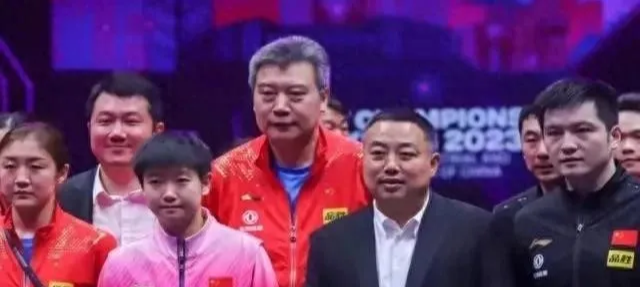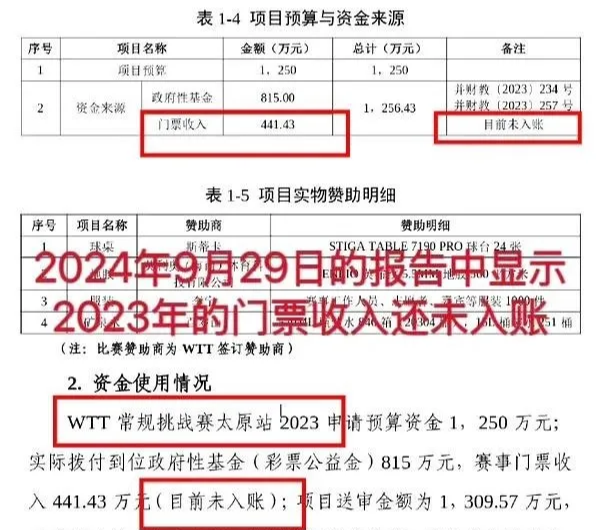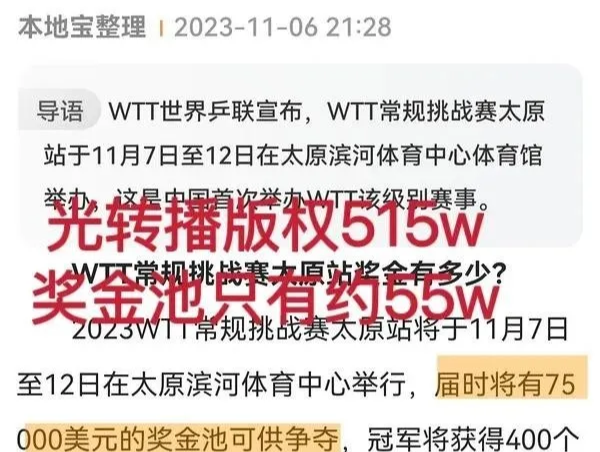China's table tennis world has recently been plunged into an unprecedented turmoil, with a series of incidents exploding one after another, drawing widespread attention and heated discussion from all sectors of society. These controversies involve issues such as corruption in management, transparency in event operations, selection and use of athletes, as well as the impact of emerging cultural phenomena, casting a shadow of doubt over the entire Chinese table tennis world.

One of the key triggers for this turmoil was the exposure of Henan Table Tennis Association Chairman Wang Zhongqi's involvement in black and gambling cases. According to journalist Du Liyan's report, the 62-year-old Wang Zhongqi was reported for suspected illegal and criminal activities. The severity of this incident can be seen from the response of local authorities: local law enforcement agencies quickly established two special task forces to investigate him simultaneously. Liu Guoliang, as the chairman of the Chinese Table Tennis Association, has also been informed of this matter, which undoubtedly sounded the alarm for the management system of Chinese table tennis.

Following closely, the financial issues of WTT (World Table Tennis Professional League) have become another focus of controversy. In the event held by WTT in Taiyuan in 2023, there were questionable financial situations: on the one hand, the event received a high local subsidy of 8.15 million yuan, and on the other hand, the broadcasting copyright alone sold for a high price of 5.15 million yuan, but the prize pool given to the athletes was only 550,000 yuan. This huge disparity has sparked strong doubts about the flow of funds from the outside world. However, in the face of calls from all sides to publish financial reports, WTT has remained silent, and this opaque attitude has intensified external speculation.

The further development of the situation is Fan Zhendong and Chen Meng's withdrawal from the world rankings, which has been interpreted as a silent protest against WTT, and has also aroused strong dissatisfaction from domestic media and fans towards WTT. This situation reflects the deep-seated contradictions and problems between China's table tennis world and international organizations.

Even more shocking is that journalists have revealed that several companies cooperating with WTT and the Chinese Table Tennis Association are under investigation, and some officials have already fallen because of this. Although the direct connection between these events and table tennis affairs still needs to be further confirmed, they have undoubtedly cast a shadow over the entire table tennis world.

In terms of national team player management, journalist He Xiaolong's revelations have caused a sensation. According to his report, Liu Guoliang, in the preparation plan for the Paris Olympic cycle, in order to ensure that Wang Chuqin and Sun Yingsha win the championship, adopted a strategy to suppress Fan Zhendong and Wang Manyu. Especially regarding the reason why Wang Manyu was suppressed, the statement "too powerful, too powerful" seems extremely absurd. Although the authenticity of these revelations still needs to be further verified, they have already caused a strong response in the table tennis world.
At the same time, the influence of "fan culture" on the national table tennis team has also become a problem that cannot be ignored. This fan culture originating from the entertainment circle has gradually infiltrated into the sports field, causing no small interference to the normal training and competition of athletes. However, in the face of this emerging cultural phenomenon, the Table Tennis Association seems to have taken no effective measures, and this laissez-faire attitude has also been questioned.
This series of events exposes many problems existing in China's table tennis world in terms of management system, event operation, athlete cultivation, etc. First of all, it is the integrity issue of the management layer, which requires the establishment of a stricter supervision mechanism; secondly, it is the transparency issue of event operation, which requires the establishment of a more open and transparent financial system; again, it is the fairness issue of athlete selection and use, which requires ensuring that each athlete can receive fair treatment and development opportunities; finally, it is how to correctly guide and manage the impact of emerging cultural phenomena on athletes.
The solution to these problems not only concerns the healthy development of China's table tennis movement, but also the overall progress of China's sports cause. Relevant departments need to take positive measures to deal with these challenges through system reform and institutional improvement, ensuring that China's table tennis movement can continue to maintain its leading position in the world sports arena. At the same time, it is also necessary to cultivate more athletes with excellent character and upright style while maintaining competitive standards, making contributions to the development of China's sports cause.